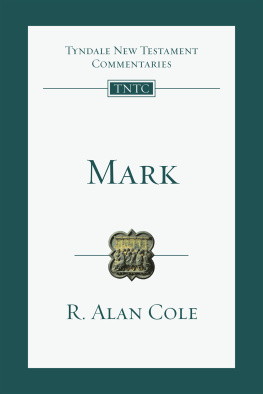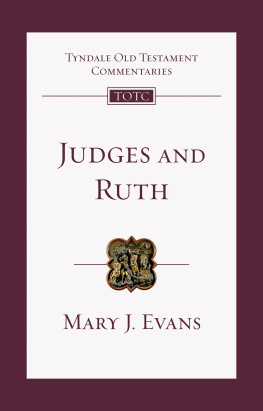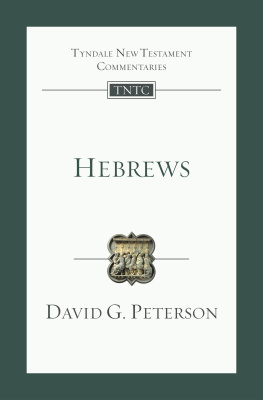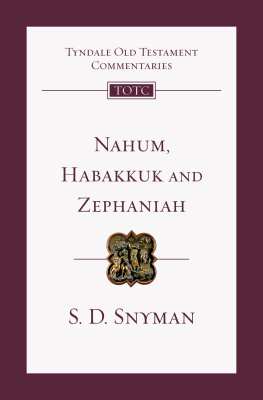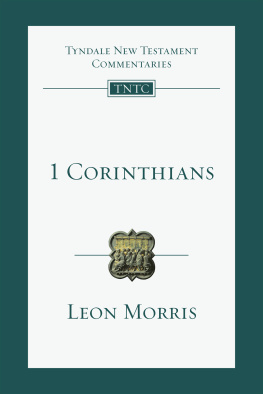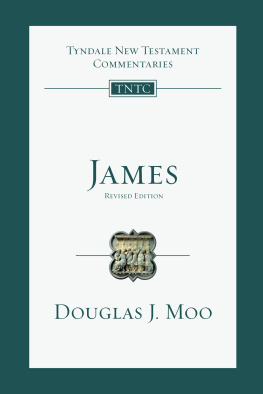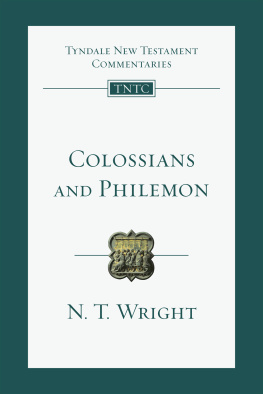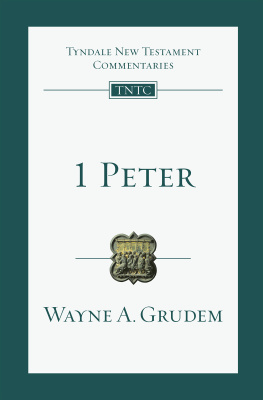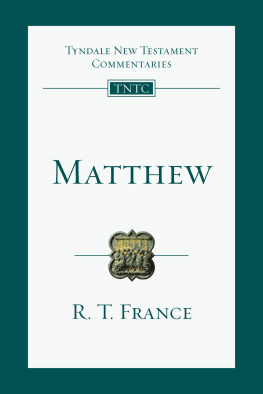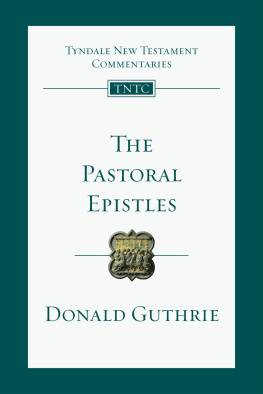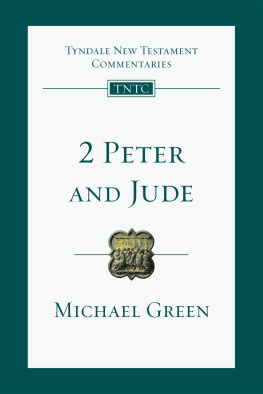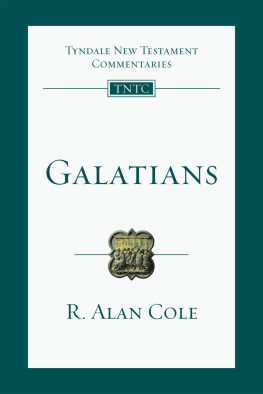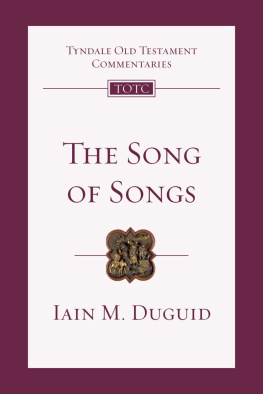TYNDALE NEW TESTAMENT
COMMENTARIES
VOLUME 2
MARK
TYNDALE NEW TESTAMENT
COMMENTARIES
VOLUME 2
GENERAL EDITOR: LEON MORRIS
MARK
AN INTRODUCTION AND COMMENTARY
R. ALAN COLE
InterVarsity Press, USA
P.O. Box 1400, Downers Grove, IL 60515-1426, USA
World Wide Web: www.ivpress.com
Email:
R. A. Cole 1989
All rights reserved. No part of this publication may be reproduced, stored in a retrieval system or transmitted in any form or by any means, electronic, mechanical, photocopying, recording or otherwise, without the prior permission of InterVarsity Press.
InterVarsity Press, USA, is the book-publishing division of InterVarsity Christian Fellowship/USA, a movement of students and faculty active on campus at hundreds of universities, colleges and schools of nursing in the United States of America, and a member movement of the International Fellowship of Evangelical Students. For information about local and regional activities, write Public Relations Dept., InterVarsity Christian Fellowship/USA, 6400 Schroeder Rd., P.O. Box 7895, Madison, WI 53707-7895, or visit the IVCF website at .
All Scripture quotations, unless otherwise indicated, are taken from the Revised Standard Version of the Bible, copyright 1952, 1971, 1973 by the Division of Christian Education of the National Council of the Churches of Christ in the U.S.A. Used by permission. All rights reserved.
First edition 1961
Second edition 1989
ISBN: 978-0-8308-9484-0 (digital)
ISBN: 978-0-8308-4232-2 (print)
This digital document has been produced by Nord Compo.
General preface
The original Tyndale Commentaries aimed at providing help for the general reader of the Bible. They concentrated on the meaning of the text without going into scholarly technicalities. They sought to avoid the extremes of being unduly technical or unhelpfully brief. Most who have used the books agree that there has been a fair measure of success in reaching that aim.
Times, however, change. A series that has served so well for so long is perhaps not quite as relevant as when it was first launched. New knowledge has come to light. The discussion of critical questions has moved on. Bible-reading habits have changed. When the original series was commenced it could be presumed that most readers used the Authorized Version and one could make ones comments accordingly, but this situation no longer obtains.
The decision to revise and update the whole series was not reached lightly, but in the end it was thought that this is what is required in the present situation. There are new needs, and they will be better served by new books or by a thorough updating of the old books. The aims of the original series remain. The new commentaries are neither minuscule nor unduly long. They are exegetical rather than homiletic. They do not discuss all the critical questions, but none is written without an awareness of the problems that engage the attention of New Testament scholars. Where it is felt that formal consideration should be given to such questions, they are discussed in the Introduction and sometimes in Additional Notes.
But the main thrust of these commentaries is not critical. These books are written to help the non-technical reader to understand the Bible better. They do not presume a knowledge of Greek, and all Greek words discussed are transliterated; but the authors have the Greek text before them and their comments are made on the basis of the originals. The authors are free to choose their own modern translation, but are asked to bear in mind the variety of translations in current use.
The new series of Tyndale Commentaries goes forth, as the former series did, in the hope that God will graciously use these books to help the general reader to understand as fully and clearly as possible the meaning of the New Testament.
Leon Morris
Authors preface to the first edition
This little book cannot pretend to be scholarly, but it does at least attempt to be theological. There are many excellent commentaries on Mark already in existence, but perhaps this slender volume may yet find a place on the shelves of those who are too busy to read the larger volumes, or who feel themselves to be too ill equipped to enjoy the scholastic riches available elsewhere in such embarrassing abundance. It is an attempt at a practical work-a-day commentary for the use of those engaged in the humbler levels of Christian service, and it has at least the merit of being produced by such a one himself. The absence of reference to many works of proven value does not correspond to scorn for their contents, but simply to the limitations of library necessary to one whose calling has been to work with his fellow Christians in the Church of South East Asia. For inadvertent lack of acknowledgment, if such there be in places, the author apologizes humbly. It, too, is not intentional, but the result of assimilation so complete that the material has become part of the author: and, rightly seen, there could be no truer compliment to the now forgotten original authors. This book now goes forth with the prayer that it may lead the readers into as much blessing as it led the writer, through the same means of the careful study of the actual text of Scripture. If it had a dedication it would be to his brethren in the Church of South East Asia, to whom the author has given so little, but from whom he has learnt so much.
R. A. C.
Authors preface to the second edition
It is not given to many to revise a book first written twenty-five years ago, and I thank the Inter-Varsity Press for the opportunity. The question is: would the same sort of commentary have been written today? Would there have been any major changes of approach? Those who compare this edition with the first will find the answers, as far as the present author at least is concerned, from the fact that the major changes are in the Introduction, which has been completely rewritten, rather than in the main body of the commentary, although many additions and references to the views of other writers have been included there. It is to be hoped that this will show that, even if the author has not changed his basic position, it is not through ignorance of those who think otherwise, and that their views have been carefully taken into account throughout. Nor is it a claim that the exegesis could not be improved, but merely the view that, given the necessary limits and given the public in view, it still seems on the whole to be rightly directed. The basic approach, of the wisdom of which the author is more and more convinced, is to let the text in its present form speak for itself, and to read it in its own light. To some this may seem simplistic; but perhaps the whole approach of Marks Gospel was simplistic too, compared with other later gospels, especially if it represents either a compilation of Petrine testimony (which not many scholars would hold in this form today) or a record of general early Christian tradition (which seems more tenable) or a combination of both. This simplicity of Marks Gospel was widely held by earlier commentators like Turner, Bartlett and Taylor; as we shall see, it has been widely challenged by later commentators influenced by some aspects of the redaction criticism school. To them, this gospel is highly theological, sophisticated, controversial and even tendentious; but the evidence for any of these characteristics is very doubtful and the present commentator cannot share their views.

